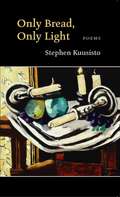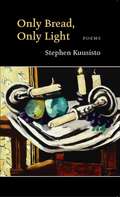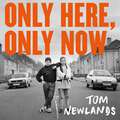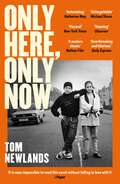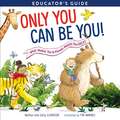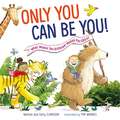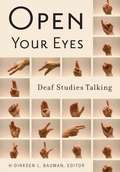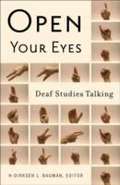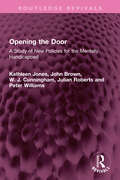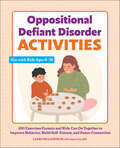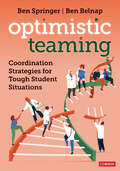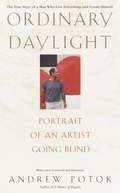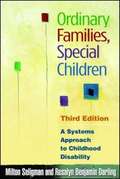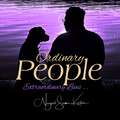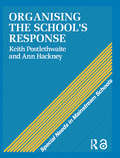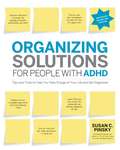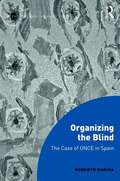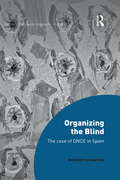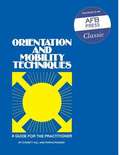- Table View
- List View
One-handed in a Two-handed World (2nd Revised Edition)
by Tommye-Karen MayerA book describing how to live effectively with the use of one hand. Explains things like how to sew a button one-handedly, sports, crafts, cooking, housekeeping and travel among many other topics. You need this book if you: Lost an arm or hand, Lost the use of an arm or hand, or Care about someone who has.
Only Bread, Only Light
by Stephen KuusistoWith this, his first collection of poetry, Stephen Kuusisto (author of the memoir Planet of the Blind) explores blindness and curiosity, loneliness and the found instruments of continuation. Exploiting the seeming contradiction of poetry's reliance upon visual imagery with Kuusisto's own sightlessness, these poems cultivate a world of listening: to the natural world, to the voices of family and strangers, to music and the words of great writers and thinkers.Kuusisto has written elsewhere, "I see like a person who looks through a kaleidoscope; my impressions of the world at once beautiful and largely useless." So it is no surprise that in his poems mortal vision is uncertain, supported only by the ardor of imagination and the grace of lyric surprise. Sensually rich and detailed, Kuusisto's poems are humorous, complex, and intellectually engaged. This collection reveals a major new poetic talent."Only Bread, Only Light"At times the blind see light,And that moment is the Sistine ceiling,Grace among buildings--no one asksFor it, no one asks.After all, this is solitude,Daylight's finger,Blake's angelParting willow leaves.I should know better.Get with the businessOf walking the lovely, satisfied,Indifferent weather--Bread bakingOn Arthur AvenueThis first warm day of June.I stand on the cornerFor priceless seconds.Now everything to me falls shadowStephen Kuusisto's 1998 memoir Planet of the Blind received tremendous international attention, including appearances on Oprah, Dateline, and Talk of the Nation. The New York Times named it a "Notable Book of the Year" and praised it as "a book that makes the reader understand the terrifying experience of blindness, a book that stands on its own as the lyrical memoir of a poet." A spokesperson for Guiding Eyes for the Blind, Kuusisto teaches at Ohio State University.
Only Bread, Only Light: Poems
by Stephen KuusistoStephen Kuusisto explores blindness and curiosity, loneliness and the found instruments of continuation. Exploiting the seeming contradiction of poetry's reliance upon visual imagery with Kuusisto's own sightlessness, these poems cultivate a world of listening: to the natural world, to the voices of family and strangers, to music and the words of great writers and thinkers.
Only Here, Only Now
by Tom Newlands'THE SCOTTISH BOOK OF THE SUMMER' HERALD 'This isn't just a great first novel; it's a great novel. And Cora, the mad, chaotic, wise, funny narrator, is one of the great characters'RODDY DOYLE'It's not every day you read a modern classic. But this feels destined to become one. A thunderous achievement'NATHAN FILER, author of THE SHOCK OF THE FALL'Only Here, Only Now heralds the arrival of an urgent and unique new voice'DAVID PEACEFife, in the blazing hot summer of 1994. Cora Mowat's mates don't understand her, but then Cora Mowat doesn't understand herself. She's stuck on a seaside council estate full of dafties, old folk and seagulls, with a thousand dreams and a restless brain that won't behave. She's dying to escape but unsure of what the future holds - if it holds anything at all for a girl like her.When her Mam's new boyfriend moves in, tensions rise in their tiny house. Gunner means well, but he's dodgy - a shaven-headed shoplifter with more than a few secrets stashed under the bed. As their attempts to forge a makeshift family unravel, Cora rails against her small-town existence in search of love, acceptance and a path to something good. But sometimes you can't move forward until you find your way back . . .In this extraordinary debut, drawn from life but written with riotous imagination, Tom Newlands explores what it means to come of age in a forgotten corner of Scotland and dream of a life that feels out of reach. Vibrant, lyrical and fiercely funny, Only Here, Only Now is a story about poverty, identity and family that shines with hope and resilience.'Cora Mowat is a feisty, Impulse-drenched, Lilt-blooded smasher of a main character and Tom Newland's prose is fierce and tender, taking us straight to the thudding heart of Cora's chaotic life'VICTORIA MACKENZIE, author of FOR THY GREAT PAIN HAVE MERCY ON MY LITTLE PAIN'Tom Newlands is the real thing. His story will change you'MICHAEL SHEEN'A piercing howl of a novel, sharp, elegant and humane. I loved it'KARL GEARY, author of JUNO LOVES LEGS
Only Here, Only Now
by Tom Newlands'THE SCOTTISH BOOK OF THE SUMMER' HERALD 'This isn't just a great first novel; it's a great novel. And Cora, the mad, chaotic, wise, funny narrator, is one of the great characters'RODDY DOYLE'It's not every day you read a modern classic. But this feels destined to become one. A thunderous achievement'NATHAN FILER, author of THE SHOCK OF THE FALL'Only Here, Only Now heralds the arrival of an urgent and unique new voice'DAVID PEACEFife, in the blazing hot summer of 1994. Cora Mowat's mates don't understand her, but then Cora Mowat doesn't understand herself. She's stuck on a seaside council estate full of dafties, old folk and seagulls, with a thousand dreams and a restless brain that won't behave. She's dying to escape but unsure of what the future holds - if it holds anything at all for a girl like her.When her Mam's new boyfriend moves in, tensions rise in their tiny house. Gunner means well, but he's dodgy - a shaven-headed shoplifter with more than a few secrets stashed under the bed. As their attempts to forge a makeshift family unravel, Cora rails against her small-town existence in search of love, acceptance and a path to something good. But sometimes you can't move forward until you find your way back . . .In this extraordinary debut, drawn from life but written with riotous imagination, Tom Newlands explores what it means to come of age in a forgotten corner of Scotland and dream of a life that feels out of reach. Vibrant, lyrical and fiercely funny, Only Here, Only Now is a story about poverty, identity and family that shines with hope and resilience.'Cora Mowat is a feisty, Impulse-drenched, Lilt-blooded smasher of a main character and Tom Newland's prose is fierce and tender, taking us straight to the thudding heart of Cora's chaotic life'VICTORIA MACKENZIE, author of FOR THY GREAT PAIN HAVE MERCY ON MY LITTLE PAIN'Tom Newlands is the real thing. His story will change you'MICHAEL SHEEN'A piercing howl of a novel, sharp, elegant and humane. I loved it'KARL GEARY, author of JUNO LOVES LEGS
Only You Can Be You Educator's Guide: What Makes You Different Makes You Great
by Sally Clarkson Nathan ClarksonOnly You Can Be You Educator&’s Guide is a companion to Only You Can Be You by Nathan and Sally Clarkson. This guide can be utilized in the classroom, in a home school setting, or by parents seeking additional resources. Ideal for 1st graders.
Only You Can Be You: What Makes You Different Makes You Great
by Sally Clarkson Nathan ClarksonSome kids like to dance and laugh out loud, and some sit quietly and make up stories in their heads--we're all different and that's okay, because the Maker of everything made us this way!In their first picture book, bestselling author Sally Clarkson and her son Nathan encourage children on the journey to discovering their strengths. The mother-and-son duo draws on themes from their first book, Different, the emotive story of Nathan's experiences growing up with mental illness and learning disabilities and Sally's journey to loving him unconditionally. With the powerful truth that what makes you different makes you great, Only You Can Be You will help children embrace their differences and celebrate the differences in others.The irresistible rhymes paired with Tim Warnes's whimsical illustrations encourage your children with reassurance in their own uniqueness. Whether they are quiet or artistic, funny or boisterous, your children will love this heartwarming read that assures them they're wonderful exactly as they are.Only You Can Be You:Features a diverse cast of childrenIs for kids of all ages, ages 3-12Is a great resource for kids who feel like they don't fit in or that no one understands themIs an encouraging read for neurodiverse children and children on the spectrum
Open Your Eyes: Deaf Studies Talking
by H-DIRKSEN L. BAUMANThis groundbreaking volume introduces readers to the key concepts and debates in deaf studies, offering perspectives on the relevance and richness of deaf ways of being in the world. In Open Your Eyes, leading and emerging scholars, the majority of whom are deaf, consider physical and cultural boundaries of deaf places and probe the complex intersections of deaf identities with gender, sexuality, disability, family, and race. Together, they explore the role of sensory perception in constructing community, redefine literacy in light of signed languages, and delve into the profound medical, social, and political dimensions of the disability label often assigned to deafness.Moving beyond proving the existence of deaf culture, Open Your Eyes shows how the culture contributes vital insights on issues of identity, language, and power, and, ultimately, challenges our culture&’s obsession with normalcy. Contributors: Benjamin Bahan, Gallaudet U; Douglas C. Baynton, U of Iowa; Frank Bechter, U of Chicago; MJ Bienvenu, Gallaudet U; Brenda Jo Brueggemann, Ohio State U; Lennard J. Davis, U of Illinois, Chicago; Lindsay Dunn, Gallaudet U; Lawrence Fleischer, California State U, Northridge; Genie Gertz, California State U, Northridge; Hilde Haualand, FAFO Institute; Robert Hoffmeister, Boston U; Tom Humphries, U of California, San Diego; Arlene Blumenthal Kelly, Gallaudet U; Marlon Kuntze, U of California, Berkeley; Paddy Ladd, U of Bristol; Harlan Lane, Northeastern U; Joseph J. Murray, U of Iowa; Carol Padden, U of California, San Diego.
Open Your Eyes: Deaf Studies Talking
by H-Dirksen L. BaumanThis volume introduces readers to the key concepts and debates in deaf studies, offering perspectives on the relevance and richness of deaf ways of being in the world. In Open Your Eyes, leading and emerging scholars, the majority of whom are deaf, consider physical and cultural boundaries of deaf places and probe the complex intersections of deaf identities with gender, sexuality, disability, family, and race.
Opening the Door: A Study of New Policies for the Mentally Handicapped (Routledge Revivals)
by Peter Williams John Brown Julian Roberts Kathleen Jones W. J. CunninghamFirst published in 1975, Opening the Door is a survey of policies and problems in services for the mentally handicapped. It describes the improvements which have taken place since 1969, when the inquiry into conditions of patients at Ely hospital in South Wales stimulated public concern into the quality of life of many mentally handicapped people in hospital. The authors discuss the continuing gap between the idea – as laid down in the 1971 Government White Paper, Better Services for the Mentally Handicapped, which set out a blueprint for development in the 1980s that was to make the antithesis of ‘hospital’ or ‘community’ obsolete – and the reality. The study is based on detailed work in one Region by a team of staff and postgraduate students in the Department of Social Administration and Social Work at the University of York. The survey covers hospital provisions, with special attention to nursing attitudes and to problems of the ‘back wards,’ the relationship between hospitals and their surrounding communities, and the development of local authority social work and residential care services. This book will be of interest to students of social administration, social policy and health.
Opportunities for Persons with Special Needs: A Policy Perspective
by K. V. S. Rao"Opportunities for Persons with Special Needs: A Policy Perspective" by K V S Rao is a comprehensive exploration of policies and initiatives aimed at empowering persons with disabilities (PwDs) in India. The book delves into the historical and statutory frameworks that have shaped disability rights in India, including landmark legislations such as the Rights of Persons with Disabilities Act, 2016. It highlights the transition from a welfare-based approach to a rights-based perspective, aligning with international conventions like the UNCRPD. The author, drawing from extensive experience in policy development, provides a nuanced analysis of various schemes, such as the ADIP scheme and Accessible India Campaign, and institutional supports that facilitate PwD empowerment. The book also features inspiring success stories and practical FAQs, making it a valuable resource for diverse stakeholders including policymakers, educators, activists, and families. Through this work, K V S Rao emphasizes the importance of an inclusive society that offers equal opportunities and recognizes the potential of persons with disabilities.
Oppositional Defiant Disorder Activities: 100 Exercises Parents and Kids Can Do Together to Improve Behavior, Build Self-Esteem, and Foster Connection
by Laura McLaughlinInspire calm and cooperation with engaging ODD activities for kids ages 6 to 12Raising children with oppositional defiant disorder (ODD) takes consistent practice and an extra dose of patience. Find the guidance you need with this supportive parenting book, written especially for parents of children with ODD. Inside, you'll find 100 activities designed to help kids reach their full potential as they learn to connect with people in positive ways.Understand ODD—Gain greater insight into oppositional defiant disorder and the emotional, social, and academic effects it can have on your child. Reinforce essential skills—Kids will learn how to regulate their emotions with activities that help them identify their feelings, practice self-control, build self-esteem, and more. Jump right in—Straightforward instructions, simple materials, and advice for maximizing each exercise make it easy for you and your child to get started right away.Break through challenging ODD behavior and reclaim your relationship with your child.
Optimistic Teaming: Coordination Strategies for Tough Student Situations
by Ben Springer Ben BelnapUncover innovative and effective ways to confront challenging behavior Complicated and intense student behavior often requires coordinated and powerful support, but that support need not be overwhelming or difficult to implement. Success with the most challenging students requires a team approach. Optimistic Teaming is your ultimate guide to building and sustaining healthy interactions as teams working with challenging students. Drs. Ben Springer and Ben Belnap share humorous insights and critical strategies that help build successful school teams and rally those teams around your students. You′ll discover how to: Remain optimistic and coordinate the best response to even the most aggressive student behaviors Identify the research and evidence base of leveraging optimism individually and in teams Use principles of positive psychology to produce successful outcomes for students and educators alike With this guide, you will discover the framework and strategies to not only remain optimistic, but make lasting, positive changes in the lives of students and their families.
Optimistic Teaming: Coordination Strategies for Tough Student Situations
by Ben Springer Ben BelnapUncover innovative and effective ways to confront challenging behavior Complicated and intense student behavior often requires coordinated and powerful support, but that support need not be overwhelming or difficult to implement. Success with the most challenging students requires a team approach. Optimistic Teaming is your ultimate guide to building and sustaining healthy interactions as teams working with challenging students. Drs. Ben Springer and Ben Belnap share humorous insights and critical strategies that help build successful school teams and rally those teams around your students. You′ll discover how to: Remain optimistic and coordinate the best response to even the most aggressive student behaviors Identify the research and evidence base of leveraging optimism individually and in teams Use principles of positive psychology to produce successful outcomes for students and educators alike With this guide, you will discover the framework and strategies to not only remain optimistic, but make lasting, positive changes in the lives of students and their families.
Ordinary Daylight: A Portrait of an Artist Going Blind
by Andrew Potok<P>Andrew Potok is an intense, vigorous, sensual man--and a gifted painter. Then, passing forty, he rapidly begins to go blind from an inherited eye disease, retinitis pigmentosa. Depressed and angry, he rages at the losses that are eradicating his life as an artist, his sources of pleasure, his competence as a man. He hates himself for becoming blind. But as he will ultimately discover, and as this remarkable memoir recounts, it is not the end of the world. It is the beginning. <P> his the story of Potok's remarkable odyssey out of despair. He attempts to come to terms with his condition: learning skills for the newly blind, dealing with freakish encounters with the medical establishment, going to London for a promised cure through a bizarre and painful "therapy" of bee stings. He wrestles with the anguish of knowing that his daughter has inherited the same disease that is stealing his own eyesight. And then, as he edges ever closer to complete blindness, there comes the day when he recognizes that the exhilaration he once found in the mix of paint and canvas, hand and eye, he has begun to find in words. <P>By turns fierce, blunt, sexy, and uproariously funny, Andrew Potok's memoir of his journey is as shatteringly frank as it is triumphant.
Ordinary Families, Special Children: A Systems Approach to Childhood Disability (3rd Edition)
by Milton Seligman Rosalyn Benjamin DarlingThis popular clinical reference and text provides a multisystems perspective on childhood disability and its effects on family life. The volume examines how child, family, ecological, and sociocultural variables intertwine to shape the ways families respond to disability, and how professionals can promote coping, adaptation, and empowerment. Accessible and engaging, the book integrates theory and research with vignettes and firsthand reflections from family members.
Ordinary People: Extrodinary Lives
by Naguib KerbaEveryone has a story. A picture is worth a thousand words, but sometimes one needs words as well. ‘Ordinary people extraordinary lives,” does just that. I’ve combined a portrait with asking people four thought provoking questions about themselves. The portrait and their answers are a compelling read about life, its challenges and each individual’s journey. At the end of each chapter, each person makes one final observation learned from their journey.
Organising a School's Response (Special Needs in Mainstream Schools #1)
by Ann Hackney Keith PostlethwaiteFirst Published in 1988. Routledge is an imprint of Taylor & Francis, an informa company.
Organizing Solutions for People with ADHD: Tips and Tools to Help You Take Charge of Your Life and Get Organized
by Susan C. Pinsky<P>ADD (Attention-Deficit Disorder) and ADHD (Attention-Deficit Hyperactivity Disorder) are prevalent in society, afflicting about 4.4% of the adult population. <P>This book outlines organizing strategies that are of value to those who want to improve their organizational (or lack of) skills in their life.
Organizing the Blind: The Case of ONCE in Spain (Interdisciplinary Disability Studies)
by Roberto GarvíaThis book is a case study which narrates the history of the National Organization of the Spanish Blind (ONCE), established in 1937 during the Spanish Civil War. Contrary to other affluent countries where most blind people live on welfare benefits, the Spanish blind enjoy full employment. Furthermore, the average income of the Spanish blind is higher than that of the sighted. Why is this so? Why the blind, and not the deaf mute, or any other group of disabled people? This book shows that ONCE answers these questions.
Organizing the Blind: The Case of ONCE in Spain (Interdisciplinary Disability Studies)
by Roberto Garvía<P>This book is a case study which narrates the history of the National Organization of the Spanish Blind (ONCE), established in 1937 during the Spanish Civil War. Contrary to other affluent countries where most blind people live on welfare benefits, the Spanish blind enjoy full employment. Furthermore, the average income of the Spanish blind is higher than that of the sighted. Why is this so? Why the blind, and not the deaf mute, or any other group of disabled people? This book shows that ONCE answers these questions. <P>The book explains ONCE'S origins, the shifting strategies that the organization has pursued to adapt to an ever-changing environment, its original goals and the way they have mutated and been interpreted, its conflicting relationship with an authoritarian regime, its struggle to find its place in a democratic regime, and its relations with other groups of disabled people. A historical narrative, the book lies at the intersection between disability and organization studies, history and sociology. <P>It will be of interest to all scholars of disability studies, the sociology of work, the history of medicine and contemporary Spanish history.
Orientation and Mobility Techniques
by Everett Hill Purvis PonderA reference for professional mobility instructors of the techniques developed during the past 30 years.
Orientation and Mobility Techniques: A Guide for the Practitioner
by Purvis Ponder Everett W. HillA large-format manual covering definitions, techniques, and devices, designed for administrators, educators, rehabilitation counselors, and other professionals concerned with the mobility training process. A classic compilation of information on an essential subject.
Orientation and Mobility: Techniques for Independence
by Steven J. Lagrow Marvin J. WeessiesThis book describes the techniques and instructional strategies used to enable an adventitiously blinded adult (i.e., one who has experienced a loss of functional vision after having had usable vision) with no other apparent handicapping conditions, to regain independence in travel in an urban environment.
Oshún and Me: A Story of Love and Braids
by Adiba NelsonTenderly illustrated by Alleanna Harris, Adiba Nelson's debut picture book Oshún and Me is a heartwarming ode to family, identity, and the beauty of braided hair. Also available in Spanish!It’s Sunday, and that means it’s Hair Day! As Mami weaves gold and cowrie shells into Yadira’s hair, she tells her the story of the goddess Oshún, showing Yadi how her Afro Latin heritage is lovingly tucked into each braid and shell.The next day, Yadi arrives for her first day at a new school. She's nervous about making friends, but with her beautiful braids, the click-clack of the cowrie shells, and a little guidance from Oshún, she finds she has everything she needs to be her best, most authentic self.A letter from the author and visual examples of different kinds of braided hairstyles are included in the back of the book.

